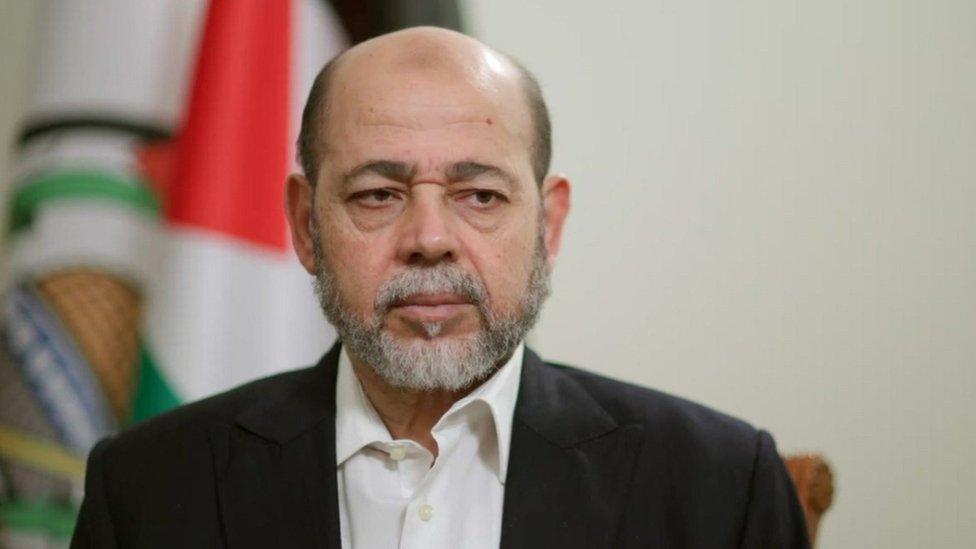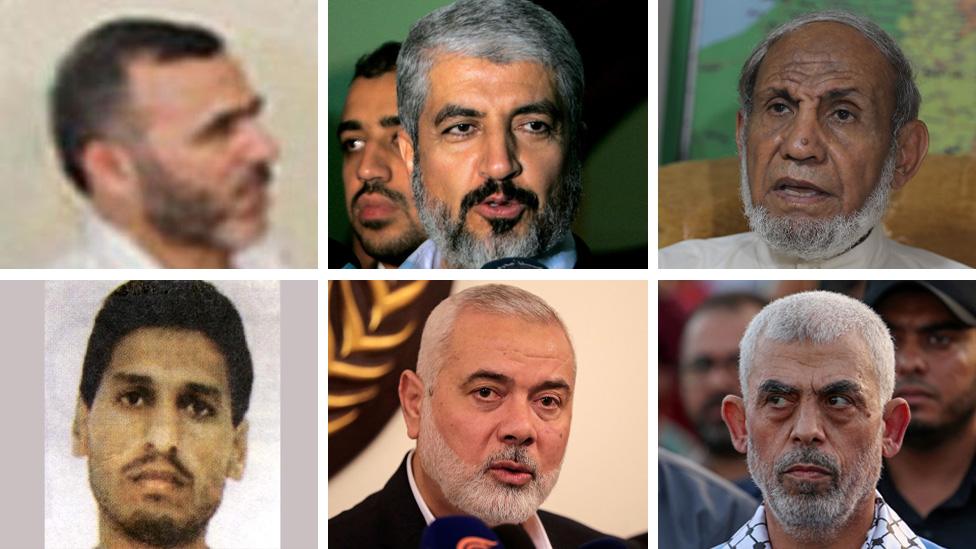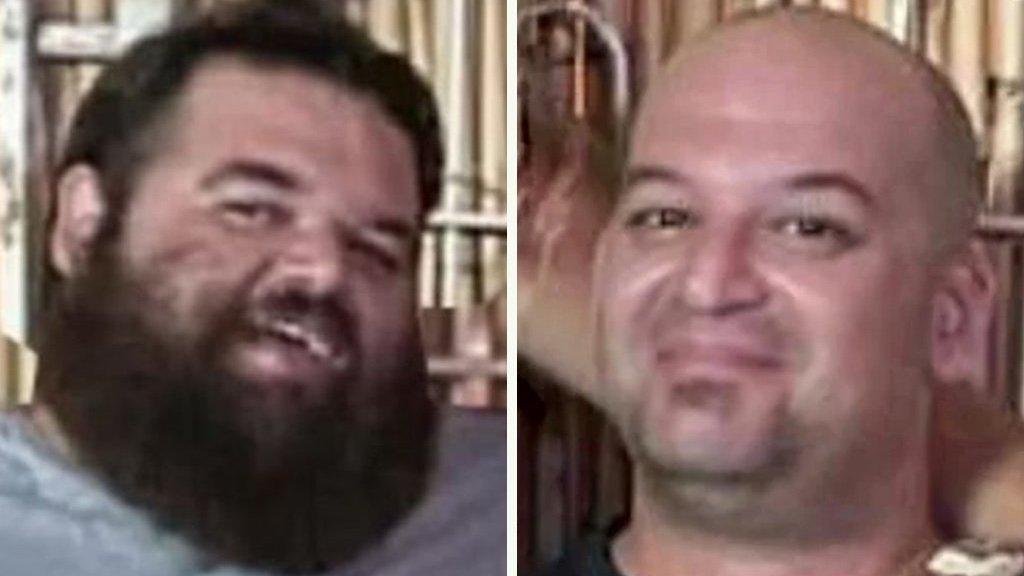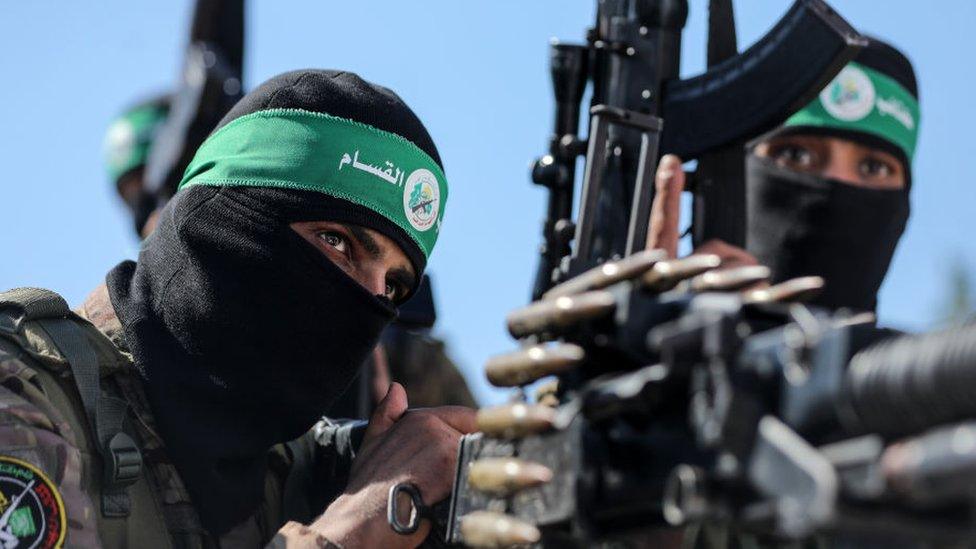Hamas leader refuses to acknowledge killing of civilians in Israel
- Published

Moussa Abu Marzouk said Hamas's armed wing "don't have to consult with the political leadership"
A senior Hamas leader has refused to acknowledge that his group killed civilians in Israel, claiming only conscripts were targeted.
Moussa Abu Marzouk told the BBC that "women, children and civilians were exempt" from Hamas's attacks.
His claims are in stark contrast to the wealth of evidence of Hamas men shooting unarmed adults and children.
The proof includes video from Hamas body cameras and first-hand testimony given to international news networks.
Israel says more than 1,400 people were killed by Hamas in the 7 October attacks, most of them civilians.
Mr Marzouk, the group's deputy political leader, who is subject to an asset freeze in the UK under counter-terrorism regulations, external, was interviewed on Saturday in the Gulf. He is the most senior member to speak to the BBC since the 7 October atrocities.
The BBC pressed Mr Marzouk on the war on Gaza, specifically on the scores of hostages being held inside the territory.
He responded that they were not able to be freed while Israel was bombing Gaza. The Hamas-run health ministry says 10,000 people have been killed since Israel started operations last month.
"We will release them. But we need to stop the fighting," he said.
Mr Marzouk recently travelled to Moscow to discuss eight Russian-Israeli dual citizens snatched on 7 October by Hamas, a proscribed terror organisation in many countries including the UK and US.
He said Hamas members in Gaza had "looked for and found two female hostages" from Russia but were unable to release them because of the conflict.
They could only realistically release hostages, he said, if "the Israelis stop the fighting so we can hand them over to the Red Cross".
Challenged by the BBC about the attack of 7 October, Mr Marzouk claimed that Mohamed el-Deif, the leader of Hamas's Qassam Brigades military wing, had ordered his men to spare civilians.
"El-Deif clearly told his fighters 'don't kill a woman, don't kill a child and don't kill an old man'," he said.
Reservist soldiers were, he said, "targeted". He maintained that only "conscripts [...] or soldiers" were killed.
But women, children and civilians were "exempt", he said.
Yet a huge body of evidence has been gathered which documents the range of bloody acts committed by Hamas in Israel on 7 October.
BBC journalists went to the scene of the attacks in their immediate aftermath and saw the bodies of civilians who had been killed.
We have also verified CCTV footage which captured shootings by Hamas. Separately, footage from Hamas body cameras has been shown to the BBC and other journalists by the Israeli government.
Other international news organisations have also pieced together, and verified, evidence of what happened on the day.
The BBC challenged Mr Marzouk on this, but the leader, whose polished, measured manner during the interview sometimes slipped into irritation, did not answer the question directly.
When asked if Hamas's political wing had known of preparations for the attack, the deputy leader said that the armed wing "don't have to consult with the political leadership. There is no need."
The political wing, based in Qatar, often presents itself as being remote from the military forces in Gaza.
The UK government sees no distinction - it proscribed the Hamas political wing as a terrorist organisation in 2021, saying that "the approach of distinguishing between the various parts of Hamas is artificial. Hamas is a complex but single terrorist organisation, external".
Mr Marzouk is also listed as a specially designated global terrorist, external by the US Treasury Department, and is indicted on several charges of co-ordinating and financing, external Hamas activities.
Hostage crisis
The interview on Saturday came after Israel had refused US requests for a "humanitarian pause" in Gaza to let aid in and help get out some of the 240 hostages taken by Hamas on 7 October.
The Israeli prime minister, Benjamin Netanyahu, said on Friday all hostages must be released before any temporary truce could be agreed.
Mr Marzouk claimed that Hamas did not possess a list of all those he referred to as "guests", nor did he know where many were, because they were being held by "different factions".
There are several groups inside Gaza including Palestinian Islamic Jihad, which work closely with Hamas but are ostensibly independent.
He said a ceasefire was needed to compile the information - there were other priorities while the territory was under bombardment.
Mr Marzouk will play a key role in how the conflict with Israel plays out, and is likely to be central in negotiations over the hostages.

More on Israel-Gaza war
Follow live: Latest updates
Analysis: Jeremy Bowen's five new realities after four weeks of war
From Gaza: Stories of those killed in Gaza
History behind the story: The Israel-Palestinian conflict

Sign up for our morning newsletter and get BBC News in your inbox.

Related topics
- Published21 January

- Published27 February

